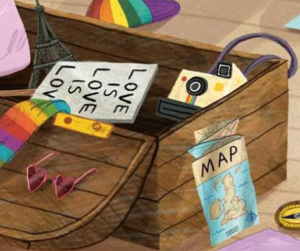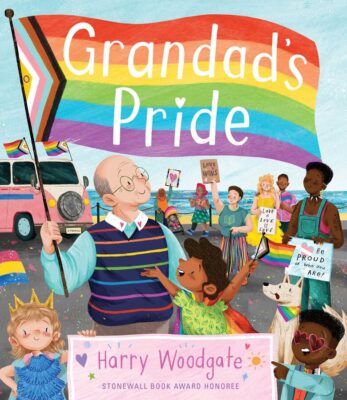Publisher’s Weekly praises “Grandad’s Pride,” a children’s book for ages 4-8, available at local libraries, for how its “Bustling, bright-hued images with a rainbow motif” portrays various “gender expressions,” including men in bondage costumes with codpieces and a bearded woman with mastectomy scars.
Related: Nashua Library Doubles Down on Promoting Bondage to Kids
Even more troubling is an illustration featuring pink heart-shaped Lolita sunglasses, an allusion to the 1962 film about a man’s sexual relationship with his 14-year-old stepdaughter. Prominently displayed near the Lolita sunglasses is a Polaroid camera and a MAP, spelled out in capital letters, which happens to stand for “Minor Attracted Persons,” a euphemism for pedophiles.

Liberals greet requests to remove these books from the children’s section with cries of censorship. They claim that people who object to sexually explicit books are targeting LGBTQ+ individuals.
But there are no gay, queer, or transgender children, just girls and boys. By suggesting children can be born in the wrong bodies, libraries put children on the path to experimental medical treatments that will leave them permanently damaged. “Queer” is a nebulous word that justifies exposing children to any sexual behavior, including adult fetishes.
Libraries no longer serve patrons by choosing materials that reflect community interests and values. Instead, they bias their selection process to push their radical agenda. Censorship is built into their system. Since libraries choose books based on reviews from publications that align with their ideology, conservative books are unlikely to make the cut.
How did we get here? A 2017 American Library Journal article questions whether “it is still good enough to provide equal access, or if it is time to pursue an active equitable access that focuses on empowering the less powerful and amplifying the voices of the unheard.”
“Queering the library” is a top priority of American Library Association (ALA) President Emily Drabinski, who describes herself as “a Marxist lesbian.” She’s also a proponent of queer theory. Like critical race theory, queer theory isn’t really a theory, but a political ideology that seeks to change power structures by promoting transgender and queer identities.
Our libraries assume that some children are born gay, transgender, and queer, and it’s their job to help girls and boys discover and explore their innate gender identities through drag queen story hours and books. For example, in “Red: A Crayon’s Story,” written for children ages 4-8 “A blue crayon is mistakenly labeled as red, and becomes much happier once he can be his true blue self.”
I’ve spoken to my local library trustees about the story “Jack, Not Jackie,” where a girl is relabeled as a boy and given a new name and pronouns because she hates frilly pink dresses, plays superhero, and splashes in the mud. It’s cruel to tell children that there’s a right way and a wrong way to be a girl or a boy.
A girl who hates pink dresses and likes to play with trucks is still a wonderful girl. Children’s books like “Jack not Jackie” tell abusive lies. My comments at the Nashua Library Trustees meeting. #NHPolitics pic.twitter.com/SCRdwVZVkH
— Sidewalk Steve (@Sidewalk_Steve) February 7, 2024
In a recent Union Leader op-ed NH Democrat Reps Nicholas Germana, David Paige, and Angela Brennan assured us that none of the challenged books qualify as pornography or “remotely fit well-established definitions of obscenity.” But if illustrations depicting oral sex and passages about anal sex don’t qualify as pornography, then what does? This isn’t a slippery slope, it’s a free-fall.
There must be no limit to what little children should be exposed to, according to the ALA’s policy statement “Access to Library Resources and Services for Minors.” The ALA “opposes all attempts to restrict access to library services, materials, and facilities based on the age of library users. The policy insists that:
Children and young adults unquestionably possess First Amendment rights, including the right to receive information through the library in print, sound, imagery data, and social media.
Libraries won’t compromise with concerned parents, whom Drabinski describes as an “angry white mob.” The ALA’s book-challenge process is stacked. The guidelines state that the materials can’t be judged based on just one part, such as an explicit passage or illustration, and instruct the trustees to consider reviews from ALA-approved journals.
Things could get worse. New Hampshire House Bill 1311 would make it a crime to remove materials that promote sexual fetishes and gender ideology from school libraries, no matter how false or explicit.
Opposing such bills is important but inadequate. States and municipalities should follow the leads of Alabama, Wyoming, Missouri, Texas, and Florida, sever ties with the ALA, and join the World Library Association. Taxpayers should defund their libraries.
For those of us in Democrat-controlled cities, the best we can do is keep speaking up. Although the librarians and trustees won’t hear us, they deserve to be embarrassed. Many moms and dads will get the message and avoid an institution that confuses and indoctrinates children and sets them on the path to irreversible medical harm.
